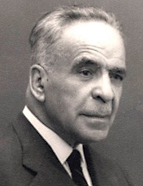

He taught at the Passos Manuel High School on a temporary basis and became a permanent member of the Leiria High School teaching staff in 1914. On behalf of the League of Friends of the Castle, he wrote the verses for the one-act play Zara (Tempos de D. Dinis) [Zara (Times of D. Dinis)] (1916), performed in 1915, which illustrates the “ constructive idealism ” he always put into collective affairs. During the First World War, he joined the Portuguese Expeditionary Corps and bravely and humanely commanded a platoon in Flanders. Under fire, he went into the German zone to rescue wounded Portuguese soldiers and picked up a dying injured German soldier in “ no man ’ s land ” . Decorated with the War Cross and taken prisoner at the Battle of La Lys in 1918, he took the opportunity to develop his knowledge of the German language and spread Portuguese literature among foreigners and countrymen. In 1956, he was awarded the Legion of Honour by France.
On his return, in 1919 he joined the teaching staff of the newly founded Faculdade de Letras do Porto [ University of Arts and Humanities of Porto ] , hired to teach Romance Philology. He would teach Literature – Portuguese, French, Italian – and “ Linguistics ” – Romance Philology, Comparative Grammar of Romance Languages, Portuguese Philology. He became full professor, but the Faculdade de Letras do Porto [ School of Arts and Humanities of Porto ] was closed in 1928. Until the actual closing of the mythical school, he also taught at the Rodrigues de Freitas High School. During this decade he lived in Porto, he published extensively in Águia and forged close ties with colleagues with whom he would later collaborate on the História de Portugal [History of Portugal] so-called of Barcelos or the less ambitious História de Portugal [History of Portugal] by Lello, the fourth volume of which he was responsible for. And the closeness between lecturers and students, a hallmark of the School conceived by Leonardo Coimbra, was certainly reflected in the way teaching was conceptualised.
This work is financed by national funds through FCT - Foundation for Science and Technology, I.P, in the scope of the projects UIDB/04311/2020 and UIDP/04311/2020.
